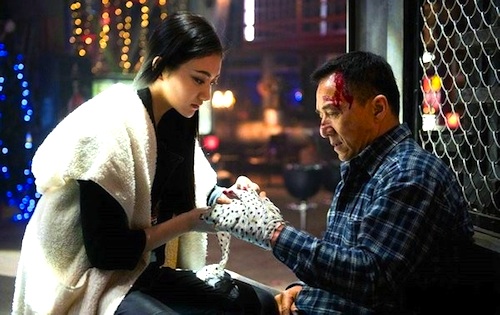By Joe Bendel. Those wondering just how much Jackie Chan has shifted his focus from Hong Kong to the Mainland need only look at the evolution of his hit Police Story franchise. What started as comedic action romp revolving around Chan’s Royal Hong Kong Inspector Chan Ka-kui is now a moody thriller-morality play that might just break its anti-hero-ish Beijing Police Captain Zhong Wen. Chan is older and wearier, but it is still nearly impossible to keep the old cat down in Ding Sheng’s Police Story: Lockdown, which opens this Friday in San Francisco.
Old Zhong is already nearly done in when meets his daughter Miao Miao at a hipster night club. Their relationship has been strained since her mother died. Frankly, this get-together is not even her idea. She agreed to set-up the meeting to humor her older pseudo-lover, the club owner Wu Jiang. In retrospect, that was a mistake.
When he comes to, Zhong learns in no uncertain terms he and his daughter, along with twenty-some other patrons and employees are hostages in Wu’s concrete fortified club. Thanks to his modifications, it will be hard for Zhong’s colleagues to shoot their way in. Instead of ransom, Wu offers a baffling ultimatum, demanding small time criminal Wei Xiaofu be brought to the club. Zhong was the responding officer who arrested Wei, so this case is clearly personal, especially since several witnesses to the incident (in which a young girl died) are among Wu’s other captives.
Frankly, Zhong blames himself so much, he just might be the only cop Bill de Blasio would approve of. Needless to say, the events of that fateful night are considerably murkier than Wu realizes, but rightly or wrongly, Zhong still carries around a mountain of guilt. Lockdown is a drastic departure from its predecessors (arguably, this is more of a title appropriation than a reboot), but it is still a reasonably effective showcase for Chan’s mature acting chops. Yes, there is still more spring in his step than most fifty-nine year olds, but the centerpiece action sequence mostly involves him getting pounded by Wu’s Filipino henchman.
While Chan and Jing Tian forge some respectable father-daughter chemistry, the latter is never given a chance to exercise the monster action skills she displayed in Special I.D., which is a most unfortunate lost opportunity. It is a real shame, because most genre fans would be totally psyched to watch the extremely telegenic newcomer fighting side-by-side with the old rubber-boned veteran.

Although Liu Ye was impressively fierce as the Emperor in The Last Supper, he is frustratingly bland as the tortured and tormenting Wu. Despite their diverse nationalities, none of the secondary villains are distinctive to any appreciable degree either. However, Zhou Xiaoou adds a surprising potent element of pathos as the sad sack Wei.
Everyone will duly note Lockdown’s “Die Hard in a night club” concept, with liberal elements of Lethal Weapon’s Sgt. “Too Old For This” Murtaugh thrown in for good measure, but its borrowings were maybe not be so conspicuous in its target market. That is fair enough, considering Hollywood’s magpie tendencies. In fact, it is a slick looking production, thanks to the metallic neon set design and Yu Ding’s noir-ish cinematography. The weak bad guys are a drawback, but action fans will still enjoy watching a new and largely credible outing from Chan. Recommended for his fans, Police Story: Lockdown opens this Friday (6/5) in San Francisco at the 4-Star Theatre and in Los Angeles at the Arena Cinema.
LFM GRADE: B-
Posted on June 3rd, 2015 at 2:47pm.